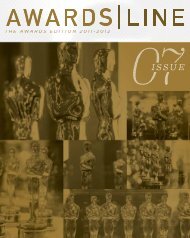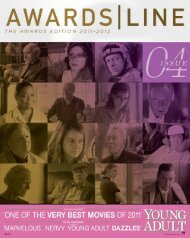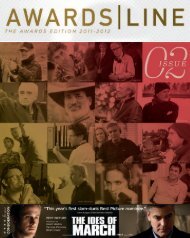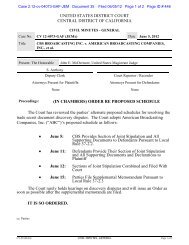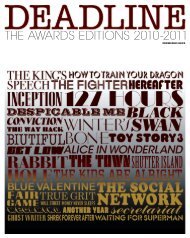MOVIE/ MINISERIES & REALITY ISSUE
MOVIE/ MINISERIES & REALITY ISSUE
MOVIE/ MINISERIES & REALITY ISSUE
You also want an ePaper? Increase the reach of your titles
YUMPU automatically turns print PDFs into web optimized ePapers that Google loves.
More ThanElementaryRising Star Cumberbatch Marvels at the Mystery of ‘Sherlock’s’ SuccessBy Michael AusielloWhy Sherlock’s Benedict Cumberbatchhas yet to be nominated for an Emmy is aquestion that might befuddle even his supersleuthalter-ego. But, rather than solve themystery, this year it might instead be resolved.Not only is the actor’s name – memorableas it is – on the verge of becoming a householdone, thanks to his appearances in two oflast year’s Oscar contenders, War Horse andTinker Tailor Soldier Spy, but he’s also collaredthe plum role of Capt. Kirk’s nemesis, Khan,in the highly anticipated Star Trek sequel.On top of all that, his work in his PBS hit’ssecond season was – almost unimaginably –better than his work in the first. Is the caseof the elusive Emmy nod about to be closed?AWARDSLINE: Of the three episodes in Season 2, Masterpiecehas chosen to submit “A Scandal in Belgravia” for Emmy consideration.Do you agree that that was the strongest of the three?BENEDICT CUMBERBATCH: It’s tough to say. It was thefirst you got to see Holmes, who at times is less thanheroic and very adolescent, experience love. Not thathe was in love, but he was in the midst of playing orexperiencing or being seduced and toyed by and withlove. It was a very smart play on the Irene Adler story.Irene (played by Lara Pulver) and Sherlock were liketwo predators circling each other waiting for the kill— it was hardly conducive to the normal conversationyou would have on a first date. It was really, reallyenticing because it works on the principle that the bestromantic stories are about the waiting (and) the game;the audience is just waiting for something to happen,and it doesn’t necessarily happen. I think it combinesso many elements of what the show is about: the wit,the action, the visual style. (“Belgravia”) also (spanned)quite a long period of time, which made it feel weirdlymore like a film than most anything I’ve ever done. It’simpossible to say whether it’s the better one. But I’mvery proud of it.AWARDSLINE: What were the particular acting challenges youfaced depicting the twisted relationship between Irene and Sherlock?CUMBERBATCH: Well, he’s supposedly an asexual, emotionlessmachine, and has cut off feelings of attractionor sensory enjoyment or interest in the female formother than to gain information. So it was (about) howto get the audience to believe that you could possibly bein a position that was vulnerable – how could he possiblybe feeling something for this woman? But the thingabout (Irene) that is very obvious when you read (the1891 short story by Arthur Conan Doyle in which thecharacter is first introduced) is Sherlock definitely doesfall for her, and he does lose his cool; he’s no longer thelogical machine. He fell for her charms. And so it wasa balancing act, but it was so deftly written (by StevenMoffat) that it was so easy to do.AWARDSLINE: Do you have a process for getting into character asSherlock or do you just show up and, wham – you’re him?CUMBERBATCH: [Laughs] No, I’m much slower thanhim. I have to rev up an engine that needs a lot ofoil and concentration and focus. There’s an elasticityto his movements as well. He’s ferociously expressive,and I’m very still and content, so there’s different moodswings and temperatures and tones to experiment within any given situation. But I take my time. I’m verygood at switching it on.AWARDSLINE: The awareness for the show is not as high here inthe U.S. as it is in Britain, but that seems to be changing. Are youfeeling that shift as you spend more time in the States?CUMBERBATCH: I am a bit. We don’t have a massivepublicity budget, and I’ve been in L.A. for three anda half months now (shooting Star Trek) and every otherday I’m passing a billboard of Game of Thronesor The Killing or Mad Men – all shows I love.It would just be wonderful to drive down (SunsetBoulevard) and see one Sherlock poster. It wouldmake me feel like we’re reaching out to the boredand confused Angelenos in their traffic jams and justmaking them think about it because there’s (so muchcompetition) for the viewing audience now; there’sso much high quality. So for a PBS show to gain thekind of audience we’ve got is a huge testament to howpopular we are. And you know, we’re not a perioddrama – and I don’t mean that disparagingly (againstDownton Abbey), despite how my comments havebeen (misinterpreted in the past). There’s a romanticassociation with British history and nostalgia,which fuels that across the generations, whereas Ithink (Sherlock) has encapsulated a younger audience.AWARDSLINE: Speaking of which, did you get any blowbackfrom the perceived slam you made against Abbey’s second seasonin that recent New York Times article? [Reporter’s note:In the piece, Cumberbatch recalled an incident atthe Golden Globes in January where Masterpiece execRebecca Eaton playfully taunted him with the statuetteAbbey had just won. “I just looked at it and went:‘Begone, woman,’” he recounted. “‘Bring it back whenit says Sherlock or Steven Moffat or myself – someoneelse who’s more deserving than the second (season)of Downton Abbey.’”]CUMBERBATCH: Oh God, you would not believe it! Imean, honestly, it’s like people don’t have any senseof irony or a brain. First of all, I knew it was the first(season) that it was getting awarded for, so that was thefirst part of the joke. The second part is that RebeccaEaton, the executive producer on Sherlock and Downton,is a friend. The third, and probably the most important,is that (Abbey creator) Julian Fellowes has known mesince I was born. (Abbey leading man) Dan Stevens isone of my good friends – one of my closest friends inEngland – as is Michelle Dockery. There’s just noway I would say something like that without it beingtongue-in-cheek. And I don’t walk around town saying“Begone, woman!” And suddenly (I’m in the middle of)a PR disaster. Maybe I am a PR disaster because I talktoo much or don’t filter enough. But I was kind of mortified.I play such a contemporaneous, vile and whiplashsmart(character) who doesn’t (tolerate) mediocrity orany type of bureaucracy or any stupidity, and yet as anactor – a misunderstood actor – you have to put up witha lot of it. So I just let that go. I can tell you I’m a hugefan of Downton, and what I said was quite, quite clearly– to most intelligent New York Times readers – a joke.AWARDSLINE: It sort of brings up the point that there is an inherentcompetitiveness to awards.CUMBERBATCH: Well, yeah, but I mean, you have to takeit all with a pinch of salt. What we do for a profession isan absolute gift of a job; it’s a blessing. So then awardson top of that? They’re sort of fantasy icing on thecake. Do awards change careers? Well, I haven’t heardof many stories where that’s the case. It’s a fun excuse tomeet colleagues and celebrate people who’ve done wellthat year in certain people’s eyes, and it’s nothing morethan that. If it’s taken more seriously than that, thenwe’re all sort of working for the wrong reasons. So ifthere’s rivalry, well, you know, it’s pretty much forgottenthe minute the next glass of wine is drunk on the night.AWARDSLINE: You’re about to be exposed to a much larger audiencein J.J. Abrams’ Star Trek sequel. Should we be worried thatbig-time Hollywood success will take you away from Sherlock?CUMBERBATCH: Oh, no. No, not at all. I’ll always doSherlock – it’s something I’m not going to give up on. Ilove it too much. It’s hard work, but it’s so rewardingand such a lovely bunch of people who do it. We loveour fans, and we love what it’s created. It’s an incrediblething to be part of; it doesn’t happen that often.Don’t worry; it’s not going to disappear.AWARDSLINE: When do you start shooting Season 3?CUMBERBATCH: January. That’s the plan.AWARDSLINE: And then beyond Season 3?CUMBERBATCH: There’s no reason for us to stop if it’sstill being adored and we still enjoy doing it. We onlydo three (episodes) at a time, so I think the normal fearof over-stretching the mark and just doing too many(doesn’t apply). It’s good to leave people wanting more.I’d like to see (Sherlock) getting older. We’re startingquite young. It’s rare to see Holmes and Watson at thebeginning of their relationship; we usually join themin their mid- to late-40s or -50s. I’ve got a way to go.I mean, I’m only 35.24EMMY AWARDS PRINT EDITIONS 2012Benedict Cumberbatch as Sherlock with Martin Freeman as Watson



